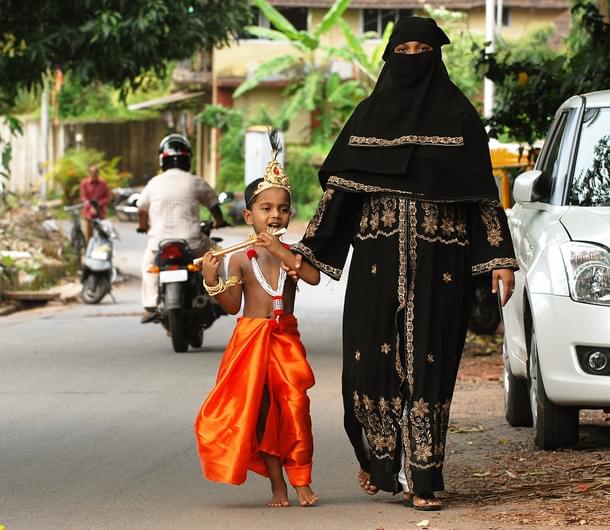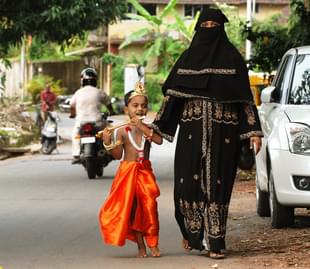Ideas
India’s Inclusive Islam And Global Peace
Syed Ata Hasnain
Mar 07, 2017, 07:28 PM | Updated 07:28 PM IST
Save & read from anywhere!
Bookmark stories for easy access on any device or the Swarajya app.


This is an adaptation of a speech made by the author at a recent inter faith event.
When we have esteemed guests from Islamic and other countries visiting India one of the major responsibilities of Indian Muslims is to make them aware of the existence of Islam in India and its rich, inclusive nature in terms of its contribution to India’s cultural scene. Also, it is necessary to make them aware of how much Islam enriched itself through its interactive existence with other major faiths of India and what it absorbed from the harmonious environment of the subcontinent. Through the turbulent times since Islam has been challenged from within, by a minority which wishes for it not to progress but rather regress, India’s Muslims have shown a beacon to the followers of the faith.
India's 180 million Muslims have almost completely remained aloof from the shenanigans of violent extremism which plagues its neighbour and so many other nations. I am one in this congregation who comes from a profession perceived by society to be associated with violence. I have been a soldier for 40 years and have had hundreds of thousands of fellow soldiers under me, executing my directions and orders. So for me to be speaking about the message of peace may appear a bit awkward and a bit paradoxical. But let me clarify right here that the choice of using my knowledge and skills as a leader and a soldier was always based upon justice, fairness and minimalistic approach; something I imbibed in the Indian army.
I am a human, a proud Indian and a Muslim. I am aware how my faith is perceived worldwide today as a faith devoted to intolerance and the employment of violence as a means to achieve the ends of what is misperceived as the aim of Islam, i.e. the spread of the faith by means foul and fair and the domination of the world. I consider those within my faith who act and project such a perception as enemies of the faith and enemies of humanity, and I shall justify my belief.
Faith is no doubt based upon belief, implicit belief, but it is also based upon rationale and the power of intellect and human choice brought on by the capability to reason, apply and absorb.
Islam, in reality, is founded upon equanimity, balance, moderation, and facilitation. As Tawfik Hamid, author of Inside Jihad, “Islam rejects extremism, radicalism and fanaticism—just as all noble, heavenly religions reject them—considering them as recalcitrant ways and forms of injustice”.
Furthermore, extremism is an aberration that has been experienced by all nations, races, and religions. The singling out of Islam and its followers in the current times is only because of the contextual situation where enemies of Islam, many within the faith have employed practices which are alien to its values and beliefs and civilised societies in general. The human race was created to progress not regress, to discover the undiscovered, in science and arts, in nature and space.
You cannot hold this great faith of a billion people ransom to the rabid views of a few who want it pegged to where it was 14 centuries ago. Islam, like all great faiths is progressive, tolerant and transparent, with respect for all other faiths.
It is only appropriate to outline and recall how I developed respect for different faiths even while following the tenets of Islam, which is my faith. My parents followed Islam and set for me examples of how to be a good Muslim. I was educated in a Christian school where I read the Bible almost like a textbook and attended chapel, singing hymns and psalms in praise of the same God to whom we all pray. During long school holidays, I continued Islamic practices at home thus imbibing a dual faith Catholicism.
On joining the Indian Army, I willingly became a part of my father’s regiment, comprising only Hindus, whose culture and best practices as a faith I imbibed. My subordinate soldiers fully respected my sentiments, and I respected theirs. They invited me to lead prayers at the unit temple even as I educated them on the tenets of Islam to which they listened with rapt attention. It is I who insisted that the unit temple flag with the huge embossed ‘Om’ on it would always be atop the leading vehicle of our convoy when we moved en masse for training or operations.
Take it from me; there is nothing like the power of conversation and discussion between followers of different faiths who consider their faiths as alternative ways to reach Him, the one and only master of this world, the maker of us all.
In the conflict zone of Jammu and Kashmir, where I had the good fortune to serve many years, I attempted to bring interfaith contact and interaction as a means of resolving mistrust and misperception. Many of my troops that were non-Muslim invited local maulvis and elders to their camps with the intent that they wished to learn more about Islam. For a few weeks the maulvis and elders were only too happy to part with information on the meaning and practices of Islam, but after that they were curious to know more about the faith of their hosts and the hosts did not disappoint them. The best interfaith harmony emerged in all these areas where this practice was adopted.
While serving the United Nations and attending knowledge programs across the world, I have attended multi-faith ceremonies with practised ease with people questioning me and many of my colleagues from the Indian Army as to how we were so comfortable, with different faiths. It is with pride that we would inform them of the nature of India’s composite society.
In a world beset with aberrations in perception, where science and technology should be acting as connectors and facilitators of dialogue across faiths, we find the spread of abhorrent ideas. Why have the younger segments of society (even from other faiths) picked up the mistaken tenets of Islam, from the wrong people and done all the wrong acts? It is because the right people are all quiet, the right ideas and values of the faith have never been brought before those who are hungry for knowledge and debate.
Correctness needs courage. Morality needs courage. Kindness needs courage and courage is something which has never been missing in Islam. The courage we need here is the one to deeply study the faith and convey the true meaning and understanding so that societies the world over will respect the followers of Islam for their wisdom, their progress for mankind and the pursuance of peace.
It is unfortunate that the pull of geopolitics on faith is being harnessed for power and not for peace. Islam is about a way of life, about being good human beings bearing a respectful value system and not for the pursuance of power to harness resources for just a few. Islam is about equality and not about subjugation.
Quoting from the Royal Court of Jordan’s Amman message, a message from all the learned leaders within Islam –“ On religious and moral grounds, we denounce the contemporary concept of terrorism that is associated with wrongful practices, whatever their source and form may be. Such acts are represented by aggression against human life in an oppressive form that transgresses the rulings of God, frightening those who are secure, violating peaceful civilians, finishing off the wounded, and killing prisoners; and they employ unethical means, such as destroying buildings and ransacking cities”.
It is God who brings life to this world; only He has the power and right to take it away, and He has not delegated that power to humans, unless in the pursuit of true justice.
For us in India, where the largest Muslim minority in the world exists, we wish to be model citizens; pursuing the tenets of our faith and respecting the tenets of all other faiths and love for the nation. We are one of the few in this world who have the privilege and pleasure to share our school benches with those of other faiths, visit their homes, respect their beliefs and partake in the joys of each other’s festivals.
We are from the land of Gautam Buddha, Guru Nanak, Gandhi and Tagore, a land of sages and spirituality. We need to count our blessings and spread the message of this land to the world.
As Indians, it is our prime duty to ensure that every foreign visitor who steps on our soil, must return to his land in amazement; wondering how 1250 million people of such diversity and wide beliefs exist in this space as a single nation with a single commitment.
The writer is a former GOC of India’s Srinagar based 15 Corps, now associated with Vivekanand International Foundation and the Institute of Peace and Conflict Studies.





